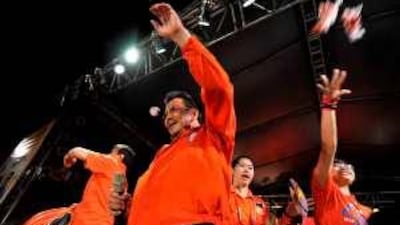MANILA // If opinion polls are anything to go by, the senator Benigno "Noynoy" Aquino should win tomorrow's election and become the first Liberal Party president of the Philippines since 1961.
The son of the late and revered president Corazon "Cory" Aquino and the martyred senator and nemesis of the dictator Marcos, Benigno "Ninoy" Aquino Jr, he has led the opinion polls since campaigning started back in February, winning popularity for his image as a politician untainted by corruption. The latest poll by Business World-Social Weather Stations on Friday put the 50-year-old Mr Aquino ahead of his nearest rivals - the self-made billionaire businessman Manuel "Manny" Villar, 60, and the former disgraced president, Joseph "Erap" Estrada, 72 - by more than 20 percentage points.
For the first time, Mr Villar has slipped into third place with 19 per cent and Mr Estrada in second place with 20 per cent. The ruling party's candidate, the former defence secretary Gilbert "Gibo" Teodoro, trails well behind with just nine per cent while the remaining five candidates are also on single figures. The main thrust of this election has not been policy, but change. Most Filipinos have had enough of the president Gloria Macapagal Arroyo, whose father Diosdado Macapagal was the last Liberal president, and want change. Mr Aquino is seen as a man relatively unsullied by dirty politics, but the fact that he is the son of a well-loved political couple has been a major advantage for him.
"It is not a question of track record versus achievement. It is about integrity or at least the public's perception of it," said Marvin Tort, the director of the Manila-based political and economic consultancy Think Tank. "Elections in this country are almost always about personality and not policies. In Mr Aquino's case, he is perceived by many as a man of integrity." Mr Villar is an individual who rose out of poverty to build a multimillion-dollar property development company. He has been a congressman and senator and now he is hungry for the country's top job, spending up to 6 billion pesos (Dh480 million) of his own money on his election campaign, some say. But he has also been linked to a corruption scandal that has soured his image in the eyes of many Filipinos.
The dark horse in the race is Mr Estrada, who still commands widespread support among the poor. Business leaders, however, quietly shudder at the thought of Mr Estrada returning as president. In the 30 months he was president, before being removed in 2001 in what he constantly describes as a coup by the Church, elites and military, he was known for having two cabinets - one comprising some of the best brains in the country, and his so-called "midnight cabinet" of drinking buddies, who would congregate at the presidential palace in Manila for all-night drinking sessions.
"If Estrada should win, I doubt you would see a return to the old ways," said Mr Tort. "Perhaps he has learnt his lesson and might be thinking more about his legacy given his advanced age. A sad possibility is that he may also be mulling payback for those who arrested and tried him for plunder." Mr Estrada was sentenced to life in prison in 2007 on charges of plunder but Mrs Arroyo pardoned him shortly after.
As for Mr Aquino, in his nine years in Congress and since he was elected to the Senate in 2007, he has done very little of note. It could well be the so-called "Cory factor" that will win him the election. In a recent interview with The National, Mr Aquino said he had never contemplated following in his mother's footsteps. But her death in August last year changed that and the mild-mannered senator and former congressman suddenly found himself swept along by a sea of emotion by Filipinos wanting an "honest" and "clean" president.
His father, Ninoy, who was killed at Manila airport in 1983, is held by many to have been the best president the country never had. Jailed by the dictator Ferdinand Marcos, he was the country's leading opposition figure and single biggest threat to Marcos. In many ways, the younger Aquino's sudden thrust into the political limelight is similar to his mother's political awakening after her husband's assassination. Mrs Aquino was the housewife, mother and devout Catholic who, reluctantly, said yes to picking up where Ninoy left off. Three years later, she led a non-violent revolution that ended Marcos' 21 years of rule.
Ramon Casiple, the executive director of the Institute for Political and Electoral Reform, said: "He [Mr Aquino] claims the legacy of his parents' anti-dictatorship, pro-people power and pro-democracy stands and stresses anti-corruption, as well as the honesty and clean government of his mother's term." Mr Aquino is seen as the antithesis of Mrs Arroyo and those who support him believe he can strengthen democratic institutions that Mrs Arroyo allowed to weaken during her nine years as president.
"If surveys are to be the guide, it seems that there is a strong preference among voters for a leader whom they can trust [over] one who has the demonstrated management skills," Mr Casiple said. "That is, they will go for the ethical leadership." foreign.desk@thenational.ae

